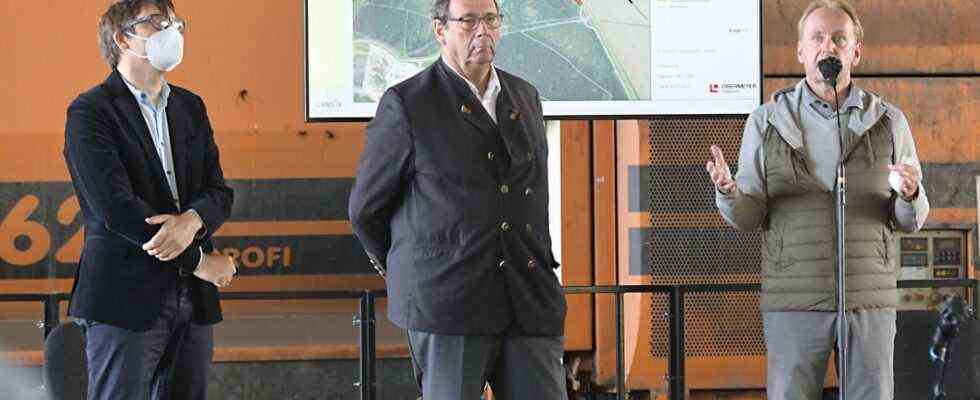A small traffic jam formed on Saturday at the entrance to the open-air event on the company premises of the Ganser Group in Kirchstockach. The topic of the first public dialogue was the planned logistics hall that the Kraft-Baustoffe company wants to build on the area of the composting plant at the Ganser Group. Matthias Ganser and his nephew at the entrance checked compliance with the requirements of the health department – a maximum of 100 people, negative corona test and contact details. The licensed doctor has been running the Ganser Group since 2019 together with his brother Günter, who was absent for health reasons. Both have big plans for the future.
Matthias Ganser presented these to around 60 interested parties, including more local political celebrities and organizers than citizens. In addition to the three Brunnthal mayors and a number of local council members, the third mayor of Höhenkirchen-Siegertsbrunn, Andrea Hanisch (independent citizens), the deputy district administrator Otto Bußjäger (UB) and district administrator Toni Stürzer (CSU) came. They all also listened to the presentation of the Josef and Luise Kraft Foundation by its board of directors, lawyer Harald Mosler.
As was to be expected, the questions mainly related to future traffic in Taufkirchner Straße. “We live on the busiest street in Germany,” emphasized a local resident. The plans made a positive impression, said one audience member, but there will be more traffic and the relieving connection to the south has been talked about for 20 years. Mosler replied very clearly that Kraft knew how such a camp works. Under no circumstances would there be more traffic, but rather less, but above all “other traffic”, meaning solid or packaged goods instead of gravel and compost mixture, for example, would be transported. There will only be factory traffic, not from specialist dealers or private individuals.
Markus Durweiler followed up and wanted to know whether someone was looking at the entire traffic. This happens in the course of the approval process, said Ganser, he understood the road construction office to mean that only one driveway onto the state road would be expanded, either on Taufkirchner Straße or further south at the junction to Höhenkirchen-Siegertsbrunn and the Hohenbrunn Luitpoldsiedlung. Here Bußjäger intervened and said that selfishly thinking he would not support the so-called southern connection, because it would bring more traffic to Höhenkirchen. A view that Mayor Mindy Konwitschny (SPD) countered at another appointment in the afternoon: “At most a few vehicles.”
In response to the remark that the volume of traffic depends on the concept at Kraft, Mosler emphasized that, as the foundation board member, he was also head of Kraft building materials. The aim of Kraft building materials is to survive, but not to maximize profits. The profit goes to the foundation, which in turn supports projects against age discrimination, old age poverty and loneliness, as well as science. Since the construction market is flourishing, Kraft-Baustoffe will pay “trade tax in a considerable amount” to the municipality of Brunnthal for its sales. If Kraft couldn’t come to the site without difficulties, it wouldn’t come.
“Is Ganser still in control of the proceedings?” Asked a citizen, rumor had it that the Ganser company had been sold. Ganser repeated that the gravel and concrete companies had been “sold to a billion-dollar company”. The entire property still belongs to Ganser and is only leased until 2035. Ganser can control what develops on the site. The construction of the power hall is an offer and at the same time “a spark for the future” with green energy at the Kirchstockach location. In the hall and the offices everything is done with electricity from PV systems on the roof.
“If power doesn’t come, then the regenerative energy park won’t come either,” Ganser added later. “And then I can only say: Brunnthal, which has also refused to use wind power, has not understood that alternative forms of energy are needed.”

